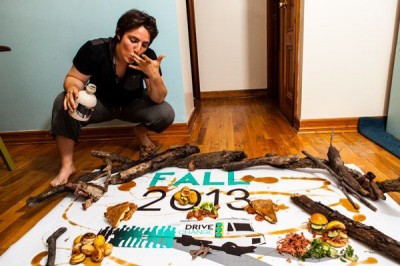What goes better with food than education? So many of us are inspired to learn through food, or inspired to eat by learning - about where the food came from, or who made it, or why it tastes the way it does. Jordyn had already made the connection between food and education when she came up with the idea to merge them together with social justice. Her story is a testament to how far we can go when our passion fuels us.
When did you know that you wanted to work in food?
Food has always been on the brain, of my heart, and in my stomach. Yet, for most of my life I saw it as a life enhancer rather than a profession. That notion changed in an instant when I was struck with the realization that through food a person can find liberty.
My "Aha" moment came to me while I was teaching incarcerated youth on Rikers Island. The school offered a Culinary Arts course to select students. Not only did the class incentivize young inmates because they could eat the food they made, it reinvigorated them. This one class boosted their sense of self-worth in a place where they were often left disrespected and demoralized. I remember the first time that one of my students served me the food he had made for teachers during a professional development day. Behind the beige jumpsuit and hairnet, there was pride in his face and I remember thinking, this is it.
I taught on Rikers for three years. My time there was full of highs and lows. Many of the lows reflected the broken nature of the system and I was disheartened by the rate at which my students would return to jail after their release. During one winter break, I tasted "maple snow taffy" in Canada and it changed my life. I remember thinking - "I'm going to make a maple snow taffy cart/truck and hire my students to work off of it." The concept for Drive Change, a restaurant quality food truck social enterprise that hires and trains formerly incarcerated youth emerged. From my lips, to my belly - my love for food mixed with my passion for social justice. There was no other path. The first Drive Change truck, Snowday, will feature a French Canadian Maple Syrup themed menu.
How did you get your current good food job?
I created it. Drive Change is a food truck social enterprise that builds and operates state-of-the-art, locally sourced food trucks. We are dedicated to brightening the lives of young people who are coming home from adult jail and prison.
How did your previous work or life experience prepare you for a good food job?
I am blending my past experiences to create a food social enterprise. Drive Change is the product of two huge elements of my identity: teaching incarcerated youth and being a foodie.
I taught high school English to adolescents who were detained on Rikers Island - I've spent my whole life tasting my way through cities that I've lived in and been fortunate enough to travel to. Food is an education.
I see Drive Change as a hybrid of two essential components of the food industry: output (the process by which the food is made and sold) and intake (the process by which it is enjoyed).
My experience as a teacher in a correctional setting forms the output - the way that we at Drive Change teach young people to prep the food and work on our trucks. Through the business, young people are engaged in transferable skill learning in classes that specifically correlate to running a food truck business. For example, we will teach social media/marketing, money management/accounting and culinary arts. Additionally, young people will learn skills through the output of hands on work experience.
My experience as a traveler and eater is associated with the intake. Eating food is learning about culture and expanding our understanding of people that are different from us. Sharing a meal becomes a time to get to know one another, engage in conversation and connect; our disparate nature is often dissolved if we are sharing a home-cooked plate of goodness. The experience of eating from the truck will be a platform for us to engage in the foodie who also has a hunger for social good.
What was the greatest obstacle you had to overcome in pursuing your Good Food Job dream?
At Drive Change, we're starting a food business and a non-profit organization/program simultaneously. Our values are clear, but I've had a difficult time justifying prioritizing food business decisions that may not directly focus on our social mission.
Investing in the trucks and in the quality of the food is essential if we are to create a broad customer base and, ultimately, build an impactful program.
What can you identify as the greatest opportunities in food right now?
I think that people are becoming socially conscious consumers and that the food industry has a remarkable capacity to capitalize on a multiple-bottom line. The idea of shared value is something that should be integrated into the food sphere rather than shunned - if you can make a profit and do good, what a wonderful win-win. Therefore, good food that does good has huge potential.
Food justice is social justice. Access to healthy eating options will create healthier and more equitable societies. There is power in food and that should be harnessed, not neglected.
If you could be compensated for your work with something other than money, what would it be?
Maple syrup.









